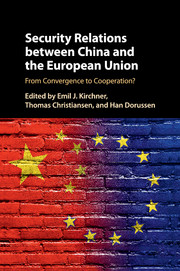Book contents
- Frontmatter
- Dedication
- Contents
- List of Tables
- Preface and Acknowledgements
- Abbreviations
- List of Contributors
- 1 EU–China Security Cooperation in Context
- 2 Chinese and EU Views of Military Security: Crafting Cooperation
- 3 Regional Solutions for Regional Confl icts? The EU, China and their Respective Neighborhoods
- 4 Aims versus Deeds: EU–China Cooperation in Nuclear Nonproliferation
- 5 Terrorism and Organized Crime: Common Concerns but Different Interests
- 6 Chinese and EU Climate and Energy Security Policy
- 7 Competing or Converging Claims on International Order? The EU, China and Human Security
- 8 Civil Protection: Identifying Opportunities for Collaboration
- 9 Cybersecurity and EU–China Relations
- 10 The Economic Security Dimension of the EU–China Relationship: Puzzles and Prospects
- 11 Is Securitizing Migration a Mandatory Choice? Lessons from the EU and China
- 12 Against the Odds: (Considerable) Convergence and (Limited) Cooperation in EU–China Security Relations
- Index
- References
5 - Terrorism and Organized Crime: Common Concerns but Different Interests
Published online by Cambridge University Press: 05 September 2016
- Frontmatter
- Dedication
- Contents
- List of Tables
- Preface and Acknowledgements
- Abbreviations
- List of Contributors
- 1 EU–China Security Cooperation in Context
- 2 Chinese and EU Views of Military Security: Crafting Cooperation
- 3 Regional Solutions for Regional Confl icts? The EU, China and their Respective Neighborhoods
- 4 Aims versus Deeds: EU–China Cooperation in Nuclear Nonproliferation
- 5 Terrorism and Organized Crime: Common Concerns but Different Interests
- 6 Chinese and EU Climate and Energy Security Policy
- 7 Competing or Converging Claims on International Order? The EU, China and Human Security
- 8 Civil Protection: Identifying Opportunities for Collaboration
- 9 Cybersecurity and EU–China Relations
- 10 The Economic Security Dimension of the EU–China Relationship: Puzzles and Prospects
- 11 Is Securitizing Migration a Mandatory Choice? Lessons from the EU and China
- 12 Against the Odds: (Considerable) Convergence and (Limited) Cooperation in EU–China Security Relations
- Index
- References
Summary
The principal security threat to many states and regions is no longer conventional military threats from other states, but civilian groupings engaged in identity politics, including terrorists (Kaldor 2012). Since the end of the 1980s, the growth and diversification of organized crime also became recognized as a substantial security threat (Albanese 2012). Common to both terrorism and organized crime is their increasingly transnational nature and potentially severe impact on economic and social stability. Therefore, the Chinese and EU responses and cooperation in these areas are of great significance. On the EU side, the fight against organized crime and terrorism has been a key driver of its general development as a security actor. On the Chinese side, the approach taken to address organized crime and terrorism reflects its dynamic domestic social and economic transformation, and also influences its global security role.
At first glance, however, there are few similarities between the Chinese and European perspectives on and experiences of terrorism. China faces various separatist movements that resort increasingly to terrorist attacks, while in Europe, serious ethnic-separatist terrorism, as exemplified by ETA, the Basque separatists, or the Irish Republican Army, has largely been on the decline. Instead, the EU has been mostly concerned with Islamist radicals and, to a lesser degree, political right- or left-wing extremists. Chinese attempts to associate domestic terrorists, mainly Uighurs, with global Islamist terrorism have not generally been recognized by Western countries. If one adds the long-standing differences between Europe and China over the status of Tibet and the principle of nonintervention, discussions of terrorism appear to be a potential spoiler of EU–Chinese relations rather than a basis for cooperation. However, the primary factor explaining most terrorist acts in both China and the EU is identity politics, which may provide some common ground for discussion. In addition, current events in Afghanistan, Iraq and Syria highlight the threat from spiraling patterns of sectarian violence that transcend and destroy state boundaries, which provide for more shared interests in EU–Chinese security cooperation.
In the area of organized crime, China and the EU could be expected to share considerable interests, since their economies are deeply intertwined. Their ever-expanding trade relations have been shadowed by the growth and diversification of transnational illegal economic activities, which have built on a well-known historical tradition of organized crime in both Europe and Asia.
- Type
- Chapter
- Information
- Security Relations between China and the European UnionFrom Convergence to Cooperation?, pp. 81 - 101Publisher: Cambridge University PressPrint publication year: 2016

